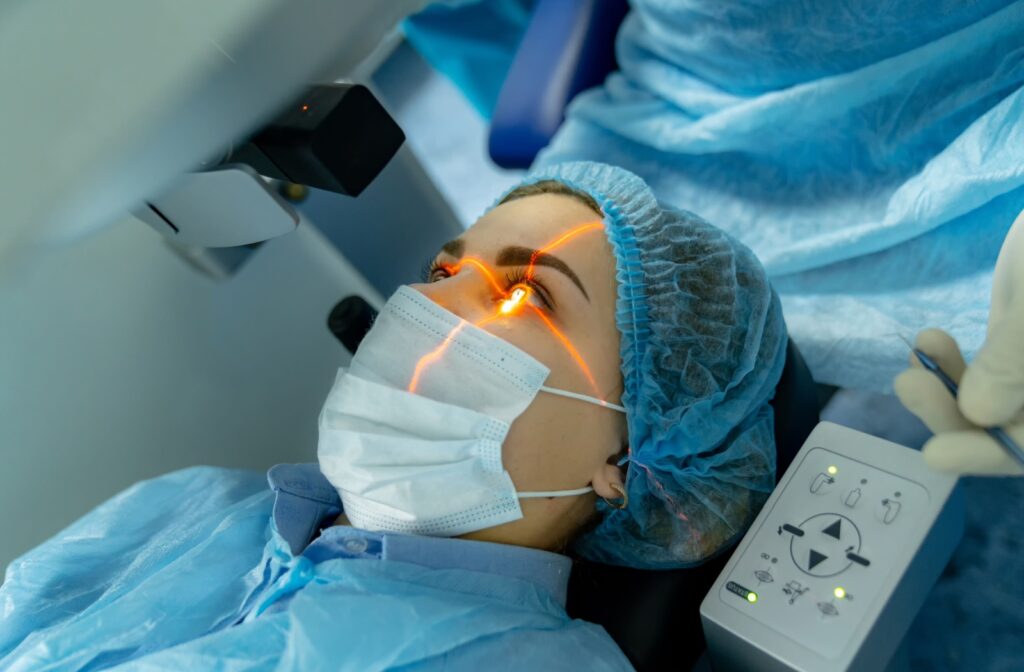For many adults, nearsightedness is an everyday problem. This refractive error is well known for how it causes blurry vision, strain, headaches and more. Fortunately, there’s an answer: laser eye surgery, a permanent approach to resolving these vision problems. So what should you expect from laser eye surgery? Does it hurt?
Laser eye surgery may be mildly uncomfortable, but it should be a pain-free experience. Your surgeon will apply numbing eye drops or local anesthetic to protect your eyes during the procedure. The surgery is quick, usually taking less than an hour, making it an excellent way to enjoy long-lasting clear vision!
The Basics of Laser Eye Surgery
Refractive problems like myopia are caused by an issue with the shape of your eye or cornea that causes light to bend incorrectly as it enters the eye, which can lead to blurry vision and eye strain when trying to focus on objects at a distance. Eye issues of this type are called refractive errors.
Usually, you can correct refractive errors with eyeglasses and contact lenses, which alter light before it enters the eye as a way of accommodating the eye’s unusual shape. However, what if you’re looking for a longer-term solution? This is when laser eye surgery becomes ideal.
The most common type of laser eye surgery is LASIK, or laser-assisted in situ keratomileusis. This surgery aims to reshape the cornea—the outermost part of the eye—so that it correctly refracts light to the retina. LASIK can be an appealing solution to refractive errors, and once you’ve recovered from the surgery, you can enjoy clear and comfortable vision without relying on corrective lenses.
Who Qualifies for Laser Eye Surgery?
While surgeries like LASIK can be effective, your optometrist will first verify that it’s a safe approach for you.
Once they’re certain that LASIK will be safe, your optometrist will need you to schedule a laser eye surgery consultation so they can examine your eyes; this lets them determine if you’re eligible for the surgery.
To qualify for LASIK, you must:
- Be older than 18
- Have a stable prescription for at least one year
- Have a cornea of suitable thickness
- Have no underlying eye conditions or significant medical problems
- Not be pregnant or nursing
If you meet these criteria, you’re likely a good candidate for laser eye surgery.
What to Expect from Laser Eye Surgery
If your optometrist thinks you’re a good candidate for laser eye surgery, they’ll help you schedule an appropriate date. There will be three key stages: before, during, and after the procedure. These are all equally important.
Before the Surgery
Before the surgery, you’ll undergo a comprehensive eye exam to:
- Measure your cornea’s thickness
- Map its surface
- Determine the overall health of your eye
You’ll discuss your medical history and any medications you’re currently taking, and then your eye doctor will walk you through the next steps, after which you’ll be referred to an experienced surgeon.
Finally, just before the surgery, you’ll receive numbing eye drops or local anesthetic to keep you comfortable.
During the Surgery
During the surgery, you’ll be awake, but your eyes will be numbed with the anesthetic or eye drops. You may experience some mild pressure on your eyes, but it shouldn’t be uncomfortable. Meanwhile, your surgeon will work through the steps of the surgery. Specifically, your surgeon will:
- Create a small flap in your cornea using a special laser.
- Gently fold back the flap to access the underlying cornea.
- Use another laser to reshape your cornea, correcting the refractive error.
- Replace the corneal flap to its original position, where it will naturally adhere without the need for stitches.
The entire procedure usually takes less than 30 minutes, and you can go home the same day. However, you shouldn’t drive yourself; instead, arrange for somebody else to take you to the surgery and drive you home.
After the Surgery
After the surgery, you’ll need to rest for a short period before going home. Your surgeon will provide you with eye drops to prevent infection and inflammation, as well as artificial tears to keep your eyes moist.
You may experience some mild discomfort—such as a gritty sensation—for a few hours after the surgery. This should go away within 24 hours or so, and you should notice a significant improvement in your vision within the next few days!

Over the next few months, your optometrist will have you return for follow-up appointments to monitor your recovery. If you notice any significant discomfort at any point, make sure to mention this; they’ll be able to help.
Are You Eligible for Laser Eye Surgery?
If you’re tired of dealing with glasses or contact lenses, laser eye surgery might be the answer you’ve been looking for. So contact our team here at EyeCare Niagara to find out if you’re a candidate!
Our team is here to help you achieve the long-lasting clear vision you deserve, so book an appointment with us today.




